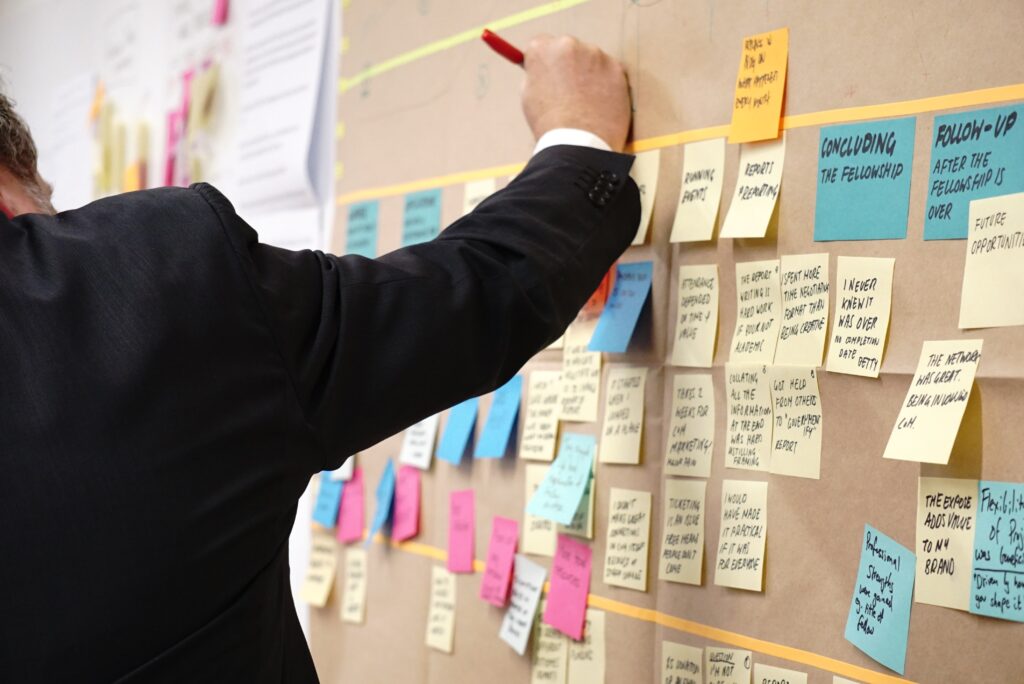The 20 Most Important Project Management Skills in 2022

What are the most important project management skills to help drive business success in 2022 and beyond? Check out our list of the top eighteen skills every project manager needs.
Updated: January 26, 2022
There’s no doubt that project managers have one of the most high-stress and high-intensity roles in any organization which is why project management skills need to be consistently honed and refined.
From juggling deadlines to managing team members and troubleshooting issues on an ongoing basis, their efforts contribute directly to the bottom line.
After all, organizations that invest in proven project management practices waste 28 times less money because more of their strategic initiatives are completed successfully.
So, what are the most important project management skills in 2022?
In this list, you’ll find 20 of the most important ones.
- 1. Communication
- 2. Leadership
- 3. Patience
- 4. Organization
- 5. Negotiation
- 6. Time Management
- 7. Risk Management
- 8. Critical Thinking
- 9. Problem-Solving
- 10. Budget Management
- 11. Sense of Humor
- 12. Motivation
- 13. Adaptability
- 14. Active Listening
- 15. Research Skills
- 17. Conflict Management
- 18. Quality Management
- 19. Scope Management
- 20. Composure
1. Communication
In order for projects to be successfully managed, PMs need to be incredibly adept at communicating efficiently and effectively with their teams. It’s crucial that they’re able to effectively share their visions, goals, ideas, and issues.
In today’s remote work environment, this can include utilizing communications tools like Slack for quick, direct messaging and Zoom, Microsoft Teams, or Skype for video conferencing.
But it also extends to their ability to create an environment where employees feel safe to communicate openly.
“Trust and sincerity are the backbones of any well-functioning team. There isn’t much you can do when these two traits are absent. Everybody should be able to share their ideas and concerns freely, with certainty that each thought will be listened to and considered.” Marcin Stryjecki, SEO Project Manager at Booksy
If you’d like to learn more about how to support strong communication, check out our resource: A Manager’s Guide to Effective Communication in the Workplace.
Or, you might want to look into a skills training workshop like Clear Communication which can help your team to develop better verbal, written, and non-verbal communication, create more impactful presentations, and learn to communicate during conflicts and decisions.
2. Leadership

Project managers need to embody exemplary leadership skills in order to oversee the successful completion of a project. That’s because they need to be able to inspire and support their team members through every step of the project while defining the roadmap to success.
If you’d like to help your organization’s project managers to improve their leadership skills, you may want to enlist a training workshop like Situational Leadership Styles which helps leaders perform even more effectively by identifying their own inherent styles and understanding how their employees want to be led.
3. Patience
The reality is that no project takes place in a straight line and things rarely go exactly as planned. Most projects have an element of challenge, and so does guiding a team through them.
And very few challenges are solved by rushing through them. The reality is that projects take time to complete successfully.
So, patience is a vital skill for every project manager.
Being patient means you need to be empathetic toward your team members and be able to keep a cool head under pressure.
“Patience is especially important in terms of implementing new processes or onboarding a new person. You either have to adjust your entire team to a new process or adjust a new member to the team and the way they work. Without patience, you won’t be able to do that since these things take a lot of time to finally stick.” Milosz Krasinski, SEO Consultant.
That’s why one of the keys to being patient is developing emotional intelligence. If you’d like to learn about how you can sharpen yours, check out our resource: The What, Why, and How of Developing Emotional Intelligence for Leaders.
4. Organization

Most projects have a ton of moving parts and a number of different team members handling multiple different pieces of the puzzle. Being disorganized is one of the quickest ways for a project to fail.
That’s why being organized is such an incredibly important project management skill. And having the right project management tools are a great way to help you stay organized.
We recommend checking out:
- Asana: Asana can help you assign tasks and view the progress of your team on those tasks, all in one place. It has an amazing interface that is fast, beautiful, feature-rich and heavily responsive. There are also different display options in which your tasks will be displayed in Asana. There is a list view, calendar view or file view which can be used according to the needs and requirements of the user.
- Trello: Trello is the most famous organizing tool of all when it comes to managing your work activities. This application allows you to track and visualize the proper progress of your activities going forward. Using their card-based layout, you can map out every task of the week in individual cards and assign them due dates, add different team members in the card and include multiple attachments. You can also add story points for each card/ task that can highlight the priority of each task that helps to keep you focused on more important tasks first.
- TaskOnBot: TaskOnBot lets you manage project and tasks directly from Slack. The plugin’s features include message boards, task management boards, and some easy-to-read visualizations that allow you to display your project data and quickly get an idea of your progress. Members can collaborate by uploading and attaching files, and assigning deadlines, and tagging members on tasks.
- Paymo: Paymo is a full-featured work and project management tool, that basically allows you to manage projects from start to finish. It bundles task management, time tracking, team scheduling, and invoicing. It also has a solid mobile app for iOS and Android devices, which is the best choice for those who are working on the go.
Staying organized can mean the difference between success and failure for PMs.
“Going Agile is the way to go ahead currently. There simply isn’t a better way of organization and management than the Agile methodology. While some of us associate it with IT only, Agile is incredibly versatile and can facilitate processes connected with all kinds of fields.” Dima Suponau, CEO of Number For Live Person
5. Negotiation
From team members to suppliers, clients, and stakeholders, project managers are constantly negotiating in one form or another. That’s what makes it one of the most important project management skills.
To be successful in negotiations, it’s important to be overly prepared; to act with integrity; to understand what you have to offer and what you want to come away with; to be clear on what you’re willing to sacrifice and when you need to talk away; and to keep your emotions in check.
To learn how you can become a negotiation powerhouse, check out our Power of Negotiation program which can teach you to prepare for negotiations, keep your emotions in check, identify good and bad habits, recognize how to influence others, and practice how to close a negotiation.
6. Time Management

From the start of the project all the way through to completion, time management is vital for success. Every project is jampacked with deadlines that need to be met which means your ability to manage your own time as well as that of your team is incredibly important.
A few ways to improve your time management skills are to:
- Set measurable and attainable goals
- Break large tasks down into smaller steps
- Utilize a time-tracking software like Toggl
- Eliminate multitasking at all costs
- Check out a training program like Practical Time Management to help you align your team’s priorities, learn time management and delegation principles, minimize distractions, increase efficiency, and prioritize tasks using best-in-class tools and software
Taking control of your time will allow you to get more done in any given workday.
7. Risk Management
As a project manager, you need to be able to identify and anticipate potential risks and challenges. That way, you can take the necessary steps to avoid them, or be prepared with a solution should they arise.
Risk management is a vital project management skill that you can develop with experience over time and by understanding and examining every facet of a project from the outset.
8. Critical Thinking
The key to being a critical thinker is removing emotion from situations so that you can analyze and evaluate them objectively.
One of the best ways to develop your critical thinking is to focus on building emotional intelligence.
Another way is to practice mindfulness, which is defined as the ability to be fully present in and engaged with the current moment without distraction of judgement.
You can practice mindfulness using exercises like:
- Pay Attention: Try to take a few minutes each day to focus on experiencing your environment with all of your senses — touch, sound, sight, smell and taste. For example, when you eat a favorite food, take the time to smell, taste and truly enjoy it.
- Live in the Moment: Try to intentionally bring an open, accepting and discerning attention to everything you do.
- Breathing Exercises: There are a ton of breathing exercises you can utilize to both relax and to become more mindful. Try the 4-7-8 method, for example, where you sit in a comfortable place, breathe in through your nose for a count of four, hold that breath to the count of seven, and exhale through your mouth to the count of eight.
- Body Scan Meditation: Lay on your back with your legs extended and arms at your sides, palms facing up. Focus your attention slowly and deliberately on each part of your body, in order, from toe to head or head to toe. Be aware of any sensations, emotions or thoughts associated with each part of your body.
For more insights on critical thinking, read our article: Critical Thinking in the Workplace: 4 Ways to Boost This Skill Among Your Employees.
9. Problem-Solving
A project manager must be able to gather information, weigh the associated pros and cons, and then formulate the best solution. Strong problem-solving skills will allow project managers to have a structured approach to solving problems to achieve a positive result.
If you’re looking for a fun and light-hearted way to practice problem-solving skills with your team, check out this article we wrote that explores 9 Unbeatable Team Building Problem Solving Activities.
10. Budget Management

Statistically, at least 85 percent of every project is over budget to some degree. So, it’s clear why budget management is a vital project management skill.
Being able to develop and control a project budget is incredibly important. And while budget management skills are most effectively developed with time and experience, there are a few steps you can take to help stay on top of your dollars and cents, including:
- Conduct consistent forecasting so that you’re on top of every overage and cost-saving in real time
- Anticipate aspects of your project that are most likely to go over-budget and pad those numbers in the planning process
- Maintain open communication with your team members so that you have an idea of where each cost in their portion of the project stands
11. Sense of Humor
Nope, this is not a joke! Humor can go a long way in relieving stress for you and your team. It can help you lighten the mood during tense situations, making it easier to approach the problem-solving process with clarity and levity. Just because you and your team work hard doesn’t mean the vibe has to be ultra-serious all the time.
12. Motivation
As a project manager, your ability to inspire and motivation your team members is absolutely vital. While every PM has their own tactics for motivating people—and every person has their own motivators—it’s all about finding the approach that works best for you.
If you’re looking for the right words to say to inspire your team, don’t worry. Somebody has probably already said it better, so just borrow from them. To help you out, we compiled a list of 89 Team Building Quotes to Inspire Your Workgroup.
13. Adaptability
Even the best-laid plans are subject to change as a project gets underway. And when they do, the best project managers are able to pivot, adapt, and find new means to achieve the overarching goal.
As much as it’s important to be adaptable in real-time, it’s also important that project managers take time to review and discuss how the team overcame challenges once the project is wrapped.
That way, you’ll be able to identify what went wrong and how it can be prevented in future. It can also be used as a point of reference during hiccups during later projects.
14. Active Listening

All too often, we tend to simply wait for our turn to speak rather than actively listening to what’s being said. Active listening is an important project management skill because successful projects hinge on your ability to keep your entire team on the same page and working toward a common goal.
To master active listening, you need to:
- Train yourself to strive to learn and ask questions
- Focus on the speaker
- Drill down on details
- Summarize and fact check the conversation
We dig deeper into this topic in our news article: 6 Impactful Tactics for Mastering the Art of Managing People.
15. Research Skills
As a project manager, you’re going to find yourself needing to answer questions you don’t know the answers to and overcome challenges you don’t readily have solutions for.
And in order to do so effectively, you’re going to need to be a masterful researcher.
One great way to approach research is to:
- Start broad, then dive into the specifics
- Learn how to recognize a quality source
- Verify information from several sources
- Be open to surprising answers
- Stay organized
- Take advantage of library resources
Adding strong research capabilities to your project management skills repertoire will make you a stronger and more resourceful PM.
17. Conflict Management

There are no two ways about it: conflict is an inevitability in a professional environment. This is especially true when a team of employees is working on a high-pressure project together.
That’s why conflict management is an essential project management skill. This can be done by:
- Identifying conflict on your team
- Turning conflict into growth opportunities
- Utilizing the right workplace conflict resolution strategies
For an in-depth and actionable analysis of each of those steps, check out our comprehensive downloadable resource: 4 Impactful Strategies for Conflict Resolution in the Workplace.
18. Quality Management
Last but certainly not least on our list of essential project management skills is quality management: your ability to ensure that your team is delivering top-quality work that helps contribute to the success of your project.
Why?
Because, even if your project is delivered on-time and on-budget, it’s irrelevant if the quality is subpar.
You’ll need to implement a system for setting expectations and measuring against them. This could include:
- Defining quality so that everyone’s on the same page
- Providing all necessary support and resources for your team members so they feel empowered to deliver quality work
- Implement a strong performance management system that helps you provide more impactful feedback and measure performance more accurately
Without quality, your project won’t be successful. So, it’s on you as a project manager to ensure it’s delivered.
19. Scope Management
Earlier on, we mentioned the value of budget management. But the flip side of that coin is scope management. This refers to understanding exactly what falls within the parameters of a project from the outset–and what doesn’t and then being able to appropriately manage the project so that nothing gets missed but nothing superfluous gets done.
When a project’s scope needs to change, be sure to document the change appropriately, create a clear audit trail and communicate the impact on budgets and timelines to all stakeholders.
20. Composure
The bigger the project, the higher the stakes, and the more intense the pressure. And if there’s one thing that’s certain in any project it’s that challenges will arise.
In order to be a great project manager, you need to learn to stay composed, even in the face of obstacles.
This is easier said than done, but a few tricks you can use include:
- Look at things analytically rather than emotionally
- Walk away from the challenge and give yourself space to think before acting
- Practice mindfulness
- Prioritize tasks by importance, not urgency
- Ask for help when you need it
Project management can be a stressful and challenging endeavor. But, with the right project management skills and tools, you can lead your team to success on every project you take on.
Can you think of any project management skills that every PM needs in 2022? If so, drop us a comment and let us know what it is!
Learn More About Spring Team Building Activities
If you’ve got questions about how the best spring team building activities for your workgroup, reach out to an Employee Engagement Consultant.




Comments